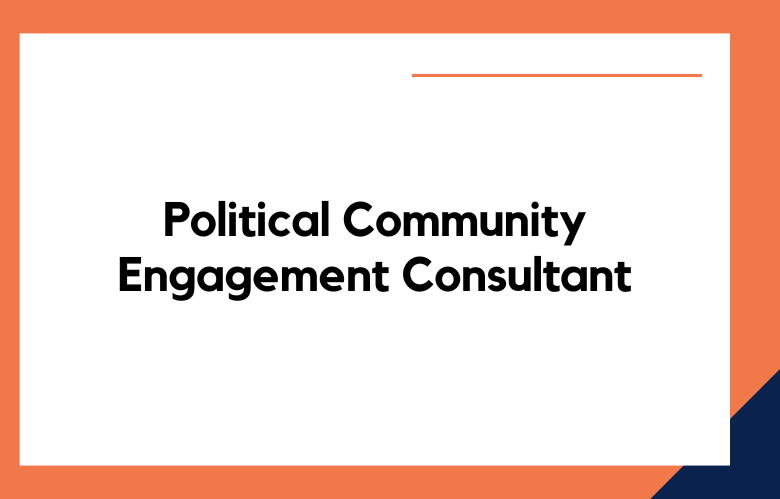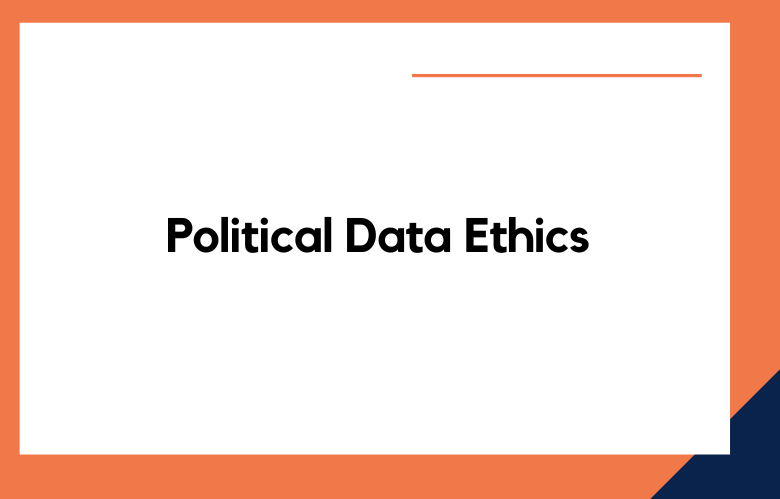Running for political office is one of the most intense and stressful experiences one can have in one’s lifetime. However, while the candidate is in the spotlight, countless individuals are working behind the scenes to ensure everything runs smoothly. This is where campaign staff comes in! Here are the different roles of a political campaign and what they do.
The campaign manager is the equivalent of a CEO in a political campaign. This person oversees everything from fundraising, developing a campaign strategy, executing polling efforts, and managing campaign staff. They’re also the go-to person when making executive decisions on critical aspects of the campaign.
As the name suggests, a finance director handles all aspects of fundraising on a political campaign.
They’re responsible for coordinating various donation efforts, hosting fundraising events, and keeping track of donations. The finance director works closely with the campaign manager to ensure the campaign meets its fundraising goals.
Social Media Director
As a Social Media Director, you will manage a company’s presence and reputation on various social media platforms.
This involves developing social media strategies, creating content, analyzing performance metrics, and engaging with followers and customers. You will need to have exceptional communication and networking skills, as well as a deep understanding of social media trends and algorithms.
Your responsibilities will include overseeing and developing social media content that aligns with the company’s brand and objectives.
This will require you to research and analyze market trends, competitor strategies, and audience behavior. You will also need to monitor performance metrics to track the success of social media efforts and adjust strategy as needed.
Scheduling and Advance Coordinator
As a Scheduling and Advance Coordinator, your primary responsibility is to manage the schedule and ensure that all appointments and events run smoothly.
This entails communicating with all involved parties, including staff, clients, and vendors, and carefully tracking their availability and preferences to create a seamless scheduling experience.
You will also manage logistical details such as travel arrangements, lodging accommodations, and event catering services and prepare detailed itineraries for all parties involved.
Moreover, you must maintain detailed records and databases containing important scheduling, financial, and logistical information.
This will require exceptional attention to detail and strong organizational skills to ensure that all data is accurate and up-to-date.
You may also be tasked with preparing reports and presentations utilizing this information or providing recommendations to streamline scheduling processes or improve the organization’s overall efficiency.
Political Consultant
A political consultant is a professional who advises candidates and political organizations on navigating the political landscape successfully.
They provide insights, strategies, and tactics to help their clients win elections, influence public opinion, and advance their political agenda.
To become an effective political consultant, one must deeply understand the political system and its workings.
This includes knowledge of election laws, campaign finance regulations, and voting patterns. Political consultants must have excellent communication skills to convey complex political messages clearly and persuasively.
Political consultants typically work for candidates running for office, political parties, advocacy groups, and other organizations with a political agenda.
They offer various services, including campaign management, public relations, polling and data analysis, fundraising, opposition research, and communication strategy development.
Policy Advisor
A policy advisor provides strategic advice and expertise to policymakers and decision-makers in government, non-profit organizations, and corporations.
This role provides research-based recommendations and analyses on complex issues like economic policies, healthcare reform, and environmental regulations.
Policy advisors typically have a solid academic background and a deep understanding of public policy theory and practice. They are skilled in research and analysis, data interpretation, and communication.
They often collaborate closely with policymakers, lobbyists, and advocacy groups to develop and implement effective policy solutions.
In addition to their technical expertise, policy advisors must possess a high degree of political understanding and critical thinking skills.
They must be able to navigate complex political landscapes and anticipate how policy decisions will impact various stakeholders and interest groups.
Field Director
The role of a Field Director is crucial in any project or campaign that involves on-the-ground implementation and execution.
This individual is responsible for overseeing and managing a team of field staff, ensuring that they are adequately trained and equipped and that they work towards achieving the goals and objectives of the project.
A Field Director must have strong leadership and management skills and the ability to communicate effectively with the team and other stakeholders.
They must be highly organized and detail-oriented, as they are often responsible for coordinating complex logistics and managing multiple moving parts.
In addition to managing the team, a Field Director must also be able to analyze data and assess performance metrics to improve their operations’ efficiency and effectiveness continually.
They must be able to identify opportunities for growth and optimization and make strategic decisions to drive progress toward project goals.
Speech Writer
A speech writer is responsible for creating compelling and persuasive speeches that communicate a particular message or motivate a specific audience.
To create an engaging and impactful speech, it is essential to include details and facts supporting your message and making it more credible.
You can persuade your audience to believe in your ideas and take action by incorporating specific examples, statistics, and anecdotes.
Moreover, a rich vocabulary and varied sentence structures are essential to create an exciting and memorable speech.
Using strong verbs and vivid imagery, you can paint a picture in your audience’s minds and capture their attention.
You can use rhetorical devices such as repetition, metaphors, and alliteration to emphasize key points and make your speech more engaging.
Field Organizer
As a field organizer, you are crucial in carrying out effective campaigns and mobilizing people toward achieving specific goals.
You are responsible for building relationships with community leaders, identifying potential volunteers, organizing events and rallies, and executing various other immersive activities that help spread awareness and drive engagement.
To be a booming field organizer, you must have exceptional interpersonal skills and communicate effectively with people from all walks of life.
You must have a deep understanding of the issues and concerns important to your target audience and an understanding of the political and social landscape in which you operate.
As you interact with people in the community, you must listen carefully to their needs and concerns and translate those into campaigns that resonate with them. This requires a high level of empathy, patience, and the ability to build trust and rapport quickly.
Communications Director
As the communications director, you are responsible for managing the flow of information both within and outside the organization.
You are critical in ensuring that key stakeholders, including employees, customers, shareholders, and the media, are informed about the company’s activities, achievements, and challenges.
To excel in this role, you must craft clear and compelling messages. You need to understand the organization’s mission, vision, values, and goals, as well as the issues affecting its stakeholders.
You must maintain a deep knowledge of the industry, the market, and the competition to stay ahead of the curve and anticipate potential roadblocks.
You will also coordinate the organization’s public relations activities and generate written content, such as press releases and social media updates.
This can involve working with journalists and media outlets to secure coverage, organizing events and conferences, and managing crisis communications in case of negative press.
Treasurer
The treasurer plays a crucial role in managing the financial affairs of an organization, institution, or company.
This position oversees financial transactions, maintains accurate budgets, and keeps precise records of all financial transactions to ensure the organization’s finances remain stable and fiscally responsible.
Treasurers create budgets, forecast revenue and expenses, and develop financial policies and procedures to meet the organization’s goals.
Treasurers must comprehensively understand accounting principles and practices to effectively manage the organization’s financial resources.
They are responsible for maintaining accurate financial records, including balance sheets, income statements, and cash flow statements. The treasurer ensures that the organization complies with all applicable laws and regulations regarding financial practices.
Finance Director
As a finance director, you oversee the organization’s financial operations, ensuring that financial resources are optimized and utilized efficiently.
You are also expected to develop and implement financial strategies that align with the organization’s overall business objectives. Your deep understanding of financial markets and regulations is critical in ensuring compliance with legal and financial reporting requirements.
In this role, you will work closely with other members of the executive team and stakeholders across the organization to provide financial insights that inform critical business decisions.
You must also be able to present complex financial information clearly and concisely, catering to the differing needs of diverse audiences.
You should regularly monitor financial performance and identify areas for improvement. This will require you to be highly analytical and able to identify patterns and trends in economic data.
Media Consultant
As a media consultant, providing in-depth analysis and evaluation of different media channels and platforms is crucial.
Knowing the target audience’s demographics and media consumption behavior is a game-changer in developing effective media strategies.
Moreover, keeping up with the latest media trends and advancements is equally vital in delivering successful media campaigns.
Digital media has recently shifted the media and advertising landscape, allowing for highly targeted and personalized advertising.
It’s also important to consider the ethical and legal considerations in media. Advertising deemed misleading or deceptive can have serious legal consequences, hurting the brand and damaging its reputation.
Therefore, a media consultant should know the guidelines and regulations to ensure ethical and fair advertising practices.
Pollster
A pollster is an individual or organization that conducts polls to gather public opinion data on various issues, topics, or candidates.
The results of these surveys are then analyzed and used to inform decision-making processes in politics, business, and other fields.
Pollsters use various methods to collect data, including telephone surveys, online polls, face-to-face interviews, and mailed questionnaires. They must adhere to rigorous ethical and professional standards to ensure the accuracy and reliability of their data.
Polling data can significantly impact policy decisions, political campaigns, and public opinion.
It can help politicians and policymakers understand the concerns and priorities of the public and adjust their strategies accordingly. It is also a valuable tool for businesses seeking to understand consumer sentiment and preferences.
General Consultant
As a general consultant, providing comprehensive and detailed recommendations to clients based on factual analysis and evaluation is essential.
In analyzing a client’s business operations, gathering as much information as possible is imperative to develop effective strategies to address their issues.
This requires an in-depth understanding of the client’s industry, market trends, competition, and operating environment.
To provide informed recommendations, a general consultant must possess expertise and knowledge in various fields, including finance, marketing, human resources, operations, and technology.
Thus, the consultant must continuously research and keep abreast of trends, practices, and new technologies related to the client’s operations.
Moreover, to provide high semantic richness, a general consultant must have excellent communication skills and be proficient in analyzing, interpreting, and presenting data.
This helps develop accurate and precise reports that are easy for clients to understand. They must communicate their rationale in providing recommendations, highlighting the expected outcomes and benefits.
Funding Coordinator
As a funding coordinator, it is essential to have a deep understanding of the funding landscape to source and secure financial resources for an organization effectively.
The role demands excellent attention to detail and strategic planning to navigate the complex web of funding options.
A funding coordinator must have a comprehensive knowledge of various funding sources such as grants, donations, investments, and loans and the respective application procedures, eligibility criteria, and reporting obligations.
They must communicate the organization’s goals and mission to potential funders and build strong relationships with them.
To effectively perform their role, a funding coordinator must have excellent project management and organizational skills to prioritize tasks, manage timelines, and ensure compliance with all funding requirements.
They must also profoundly understand budgeting and financial management to ensure the organization can effectively account for and utilize all funding resources.
Campaign Manager
As a campaign manager, you plan, organize, and execute a political campaign for a candidate or a party. This involves various activities, from crafting messaging and creating advertising materials to managing volunteers and coordinating events.
To succeed in this position, you must work well under pressure, possess excellent communication and interpersonal skills, and have a passion for political causes. You must also deeply understand the political landscape and the issues concerning your candidate’s constituents.
A successful campaign manager needs to be skilled in data and analytics. This means using research and statistical analysis to target key demographics, monitor performance, and adjust strategies accordingly.
You must also be comfortable working with technology, including social media, to engage with voters and build a solid online presence for the campaign.
Coalitions Coordinator
As the coalition coordinator, your role is crucial in maintaining relationships and fostering partnerships with other organizations within and outside your industry or field.
You are responsible for identifying potential allies and establishing alliances to help your organization achieve its goals and objectives.
To accomplish this, you must possess strong communication skills, including the ability to articulate your organization’s mission and strategy clearly and compellingly.
You must also be adept at conducting research and analysis to identify potential partners and evaluate their potential impact on your organization.
You must be skilled in managing complex relationships, including structuring agreements and negotiating mutually beneficial terms for both parties.
You must also be capable of resolving conflicts and managing disagreements during your partnership.
Another important aspect of your role is continuously monitoring and tracking your partnerships’ progress and evaluating their impact on achieving your organization’s objectives. You must be highly organized and have excellent project and time management skills.
Payroll Coordinator
A Payroll Coordinator is a highly skilled professional responsible for managing the company’s payroll process from start to finish.
This vital role requires an in-depth understanding of payroll laws, regulations, and procedures and advanced technical skills in payroll software systems and related financial applications.
On a day-to-day basis, a Payroll Coordinator is tasked with a range of duties that include verifying and entering employee data, calculating and processing wages and salaries, managing employee benefits and deductions, and ensuring accurate and timely payroll tax remittance.
As a critical finance team member, the Payroll Coordinator is also responsible for maintaining accurate records of payroll transactions, responding to employee inquiries, and generating detailed payroll reports for management.
A successful Payroll Coordinator must possess high attention to detail, analytical and problem-solving skills, and excellent communication and interpersonal abilities.
They must also be able to maintain strict confidentiality and demonstrate a strong understanding of payroll compliance requirements.
Conclusion:
In conclusion, a political campaign is a massive collaborative effort. Each person plays an important, unique role in the campaign’s success. It takes a village to win an election, and each person in a campaign has their own set of skills to make it happen.
The strengths and abilities of each role may overlap at times and depend on each other for success. Nevertheless, the most critical aspect is that everyone works towards the common goal of winning the election.
Political campaigns are an amalgamation of different roles to achieve a common objective. Successful campaigns require the right mix of individuals with other skills to ensure that the candidate’s message is conveyed effectively to the public.
Whether you’re a Campaign Manager, Fundraiser, Campaign Strategist, or Communications Director, you play a vital role in creating a winning campaign strategy.
Understanding the different roles of a political campaign and how each contributes to a successful outcome is essential for anyone hoping to be involved in political campaign management.
Call: +91 9848321284
Email: [email protected]











